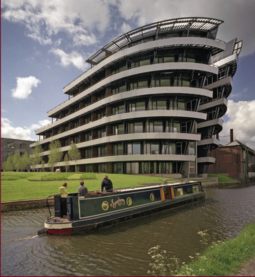Micro turbine CHP scheme serves residential development

A CHP scheme using gas micro turbines provide heat and electricity for this development in Altrincham.
Heat and electricity for a large residential complex in Altrincham are provided by two Turbec gas micro turbines from NewEnCo supported by a large thermal store to smooth out demand and enable the CHP plant to operate continuously. The installation can generate 200 kW of electricity. The Haus Project, developed by Urban Splash, is a striking residential scheme and cantilevers over the Bridgewater canal. It comprises 290 high-quality apartments. The contract was awarded by EcoCentroGen (ECG) to help meet the key project requirement for a low-emissions energy solution that pushed the boundaries of current technology and complemented ECG’s inventive and ground-breaking energy and data services provision for the project. NewEnCo’s T100 micro turbine package was chosen rather than a reciprocating engine with spark plugs as a better whole-life-cost solution. These units have very low emissions and noise levels. Their maintenance requirements are also low. However, their initial capital cost is higher. Flexibility is important when installing CHP in residential developments. Both electrical and heat loads are cyclic, and the key is to size the plant to the electrical baseload. The daily cyclic hot-water demand is dealt with by a large thermal store that enables the CHP plant to operate continuously. The use of two CHP units, rather than one, increases flexibility. A T100 unit can be run down to an electrical output as low as 30 kW, and water can be produced at 130°C. NewEnCo is working with EcoCentroGen on other large-scale residential developments based on the Turbec T100 CHP package, including projects using biofuel.
For more information on this story, click here:
Jan 07, 101Related links:


